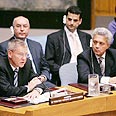
U.N. to vote on anti-Syrian resolution
Security Council set to convene Monday to approve resolution enforcing Syria to cooperate with U.N. investigation of Hariri murder, hand over suspects, New York Times reports
According to a New York Times report, the resolution threatens Syria with economic penalties should it refuse to provide the United Nations investigation team with full cooperation; the team has identified high-ranking security officials as suspects in Hariri's assassination.
It also orders Syria to detain and make available to the investigators people they suspect of involvement in the killing.
However, the resolution may prove especially problematic for Syria's President Bashar Assad, as his brother Maher Assad, and brother-in- law Asef Shawkat, the chief of military intelligence, are considered suspects in the investigation.
Several penalties to be imposed
While the text of the Security Council resolution does not specifically state that economic sanctions would be imposed on Syria should it choose not to comply, the penalties described do point to a number of hidden sanctions.
This includes imposing a travel ban on Syria by all countries, freezing assets of all suspects and establishing a Security Council committee to oversee the implementation of these penalties and rule on exceptions, the Times said.
The resolution states that in order to ensure Syria's compliance, it will "consider further measures" under Article 41 of the United Nations Charter. This article permits the Council to decide on diplomatic and economic penalties against a state.
No veto foreseen
The foreign ministers of the council's five permanent members - Britain, China, France, Russia and the United States - held a private dinner in New York Sunday night, where the final draft of the resolution was approved.
Despite a difference of opinion regarding certain aspects of the text, U.S. diplomats said they did not anticipate that either China or Russia would veto the decision. (The two countries were the most reluctant to punish Syria).
In addition, it seems that fellow Arab countries are not in a hurry to defend Syria. The Council's non-deciding Arab member Algeria has not objected to sending Syria a stern message regarding its responsibility to cooperate with the investigating team.










